查尔斯·狄更斯简介Introduction of Charles Dickens
- 格式:ppt
- 大小:6.48 MB
- 文档页数:34
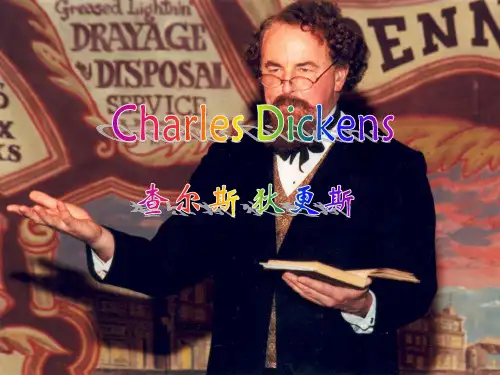
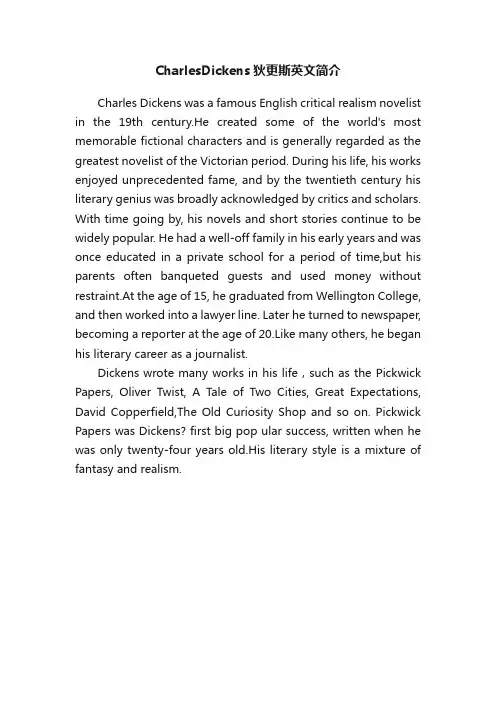
CharlesDickens狄更斯英文简介Charles Dickens was a famous English critical realism novelist in the 19th century.He created some of the world's most memorable fictional characters and is generally regarded as the greatest novelist of the Victorian period. During his life, his works enjoyed unprecedented fame, and by the twentieth century his literary genius was broadly acknowledged by critics and scholars. With time going by, his novels and short stories continue to be widely popular. He had a well-off family in his early years and was once educated in a private school for a period of time,but his parents often banqueted guests and used money without restraint.At the age of 15, he graduated from Wellington College, and then worked into a lawyer line. Later he turned to newspaper, becoming a reporter at the age of 20.Like many others, he began his literary career as a journalist.Dickens wrote many works in his life,such as the Pickwick Papers, Oliver Twist, A Tale of Two Cities, Great Expectations, David Copperfield,The Old Curiosity Shop and so on. Pickwick Papers was Dickens? first big pop ular success, written when he was only twenty-four years old.His literary style is a mixture of fantasy and realism.。
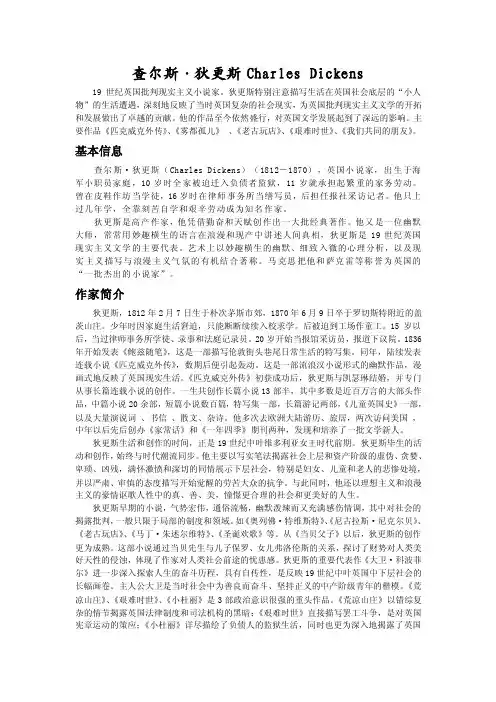
查尔斯·狄更斯Charles Dickens 19世纪英国批判现实主义小说家。
狄更斯特别注意描写生活在英国社会底层的“小人物”的生活遭遇,深刻地反映了当时英国复杂的社会现实,为英国批判现实主义文学的开拓和发展做出了卓越的贡献。
他的作品至今依然盛行,对英国文学发展起到了深远的影响。
主要作品《匹克威克外传》、《雾都孤儿》、《老古玩店》、《艰难时世》、《我们共同的朋友》。
基本信息查尔斯·狄更斯(Charles Dickens)(1812-1870),英国小说家,出生于海军小职员家庭,10岁时全家被迫迁入负债者监狱,11岁就承担起繁重的家务劳动。
曾在皮鞋作坊当学徒,16岁时在律师事务所当缮写员,后担任报社采访记者。
他只上过几年学,全靠刻苦自学和艰辛劳动成为知名作家。
狄更斯是高产作家,他凭借勤奋和天赋创作出一大批经典著作。
他又是一位幽默大师,常常用妙趣横生的语言在浪漫和现产中讲述人间真相,狄更斯是19世纪英国现实主义文学的主要代表。
艺术上以妙趣横生的幽默、细致入微的心理分析,以及现实主义描写与浪漫主义气氛的有机结合著称。
马克思把他和萨克雷等称誉为英国的“一批杰出的小说家”。
作家简介狄更斯,1812年2月7日生于朴次茅斯市郊,1870年6月9日卒于罗切斯特附近的盖茨山庄。
少年时因家庭生活窘迫,只能断断续续入校求学。
后被迫到工场作童工。
15岁以后,当过律师事务所学徒、录事和法庭记录员。
20岁开始当报馆采访员,报道下议院。
1836年开始发表《鲍兹随笔》,这是一部描写伦敦街头巷尾日常生活的特写集。
同年,陆续发表连载小说《匹克威克外传》,数期后便引起轰动。
这是一部流浪汉小说形式的幽默作品,漫画式地反映了英国现实生活。
《匹克威克外传》初获成功后,狄更斯与凯瑟琳结婚,并专门从事长篇连载小说的创作。
一生共创作长篇小说13部半,其中多数是近百万言的大部头作品,中篇小说20余部,短篇小说数百篇,特写集一部,长篇游记两部,《儿童英国史》一部,以及大量演说词、书信、散文、杂诗。
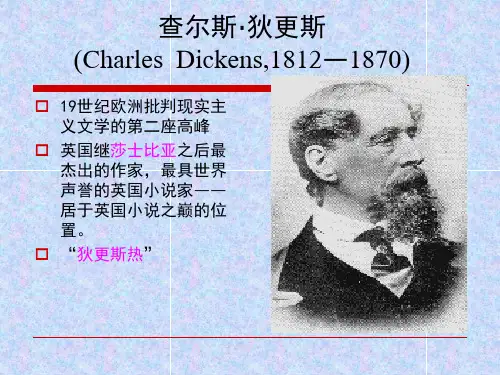
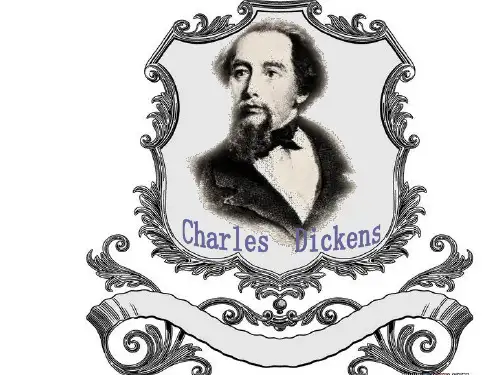
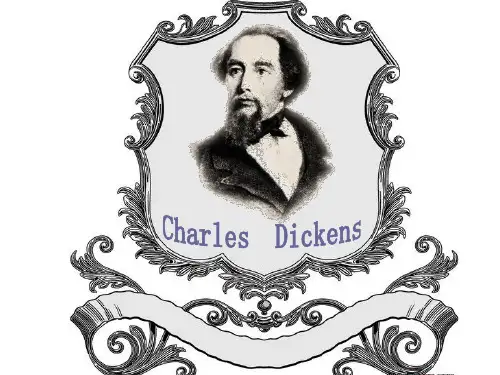
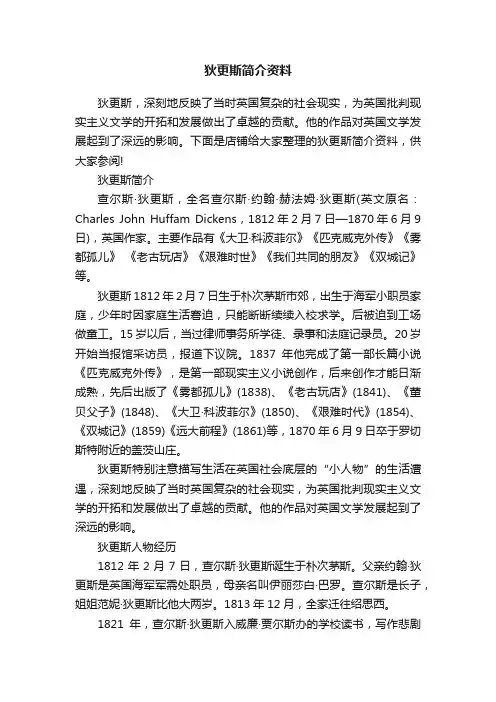
狄更斯简介资料狄更斯,深刻地反映了当时英国复杂的社会现实,为英国批判现实主义文学的开拓和发展做出了卓越的贡献。
他的作品对英国文学发展起到了深远的影响。
下面是店铺给大家整理的狄更斯简介资料,供大家参阅!狄更斯简介查尔斯·狄更斯,全名查尔斯·约翰·赫法姆·狄更斯(英文原名:Charles John Huffam Dickens,1812年2月7日—1870年6月9日),英国作家。
主要作品有《大卫·科波菲尔》《匹克威克外传》《雾都孤儿》《老古玩店》《艰难时世》《我们共同的朋友》《双城记》等。
狄更斯1812年2月7日生于朴次茅斯市郊,出生于海军小职员家庭,少年时因家庭生活窘迫,只能断断续续入校求学。
后被迫到工场做童工。
15岁以后,当过律师事务所学徒、录事和法庭记录员。
20岁开始当报馆采访员,报道下议院。
1837年他完成了第一部长篇小说《匹克威克外传》,是第一部现实主义小说创作,后来创作才能日渐成熟,先后出版了《雾都孤儿》(1838)、《老古玩店》(1841)、《董贝父子》(1848)、《大卫·科波菲尔》(1850)、《艰难时代》(1854)、《双城记》(1859)《远大前程》(1861)等,1870年6月9日卒于罗切斯特附近的盖茨山庄。
狄更斯特别注意描写生活在英国社会底层的“小人物”的生活遭遇,深刻地反映了当时英国复杂的社会现实,为英国批判现实主义文学的开拓和发展做出了卓越的贡献。
他的作品对英国文学发展起到了深远的影响。
狄更斯人物经历1812年2月7日,查尔斯·狄更斯诞生于朴次茅斯。
父亲约翰·狄更斯是英国海军军需处职员,母亲名叫伊丽莎白·巴罗。
查尔斯是长子,姐姐范妮·狄更斯比他大两岁。
1813年12月,全家迁往绍思西。
1821年,查尔斯·狄更斯入威廉·贾尔斯办的学校读书,写作悲剧《印度君主米斯纳尔》。
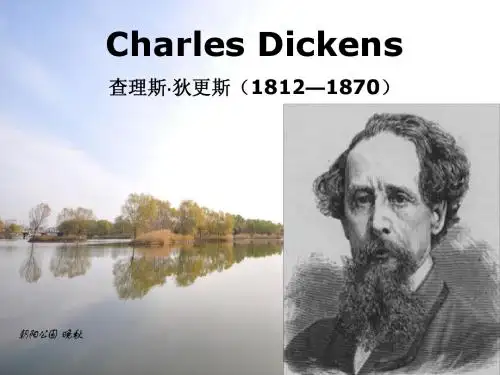

查尔斯狄更斯简介英文查尔斯·狄更斯,英国作家,特别注意描写生活在英国社会底层的“小人物”的生活遭遇,深刻地反映了当时英国复杂的社会现实,下面是店铺为你整理的查尔斯狄更斯简介英文,希望对你有用!查尔斯·狄更斯简介Charles Dickens, full name Charles John Heifam Dickens (English name: Charles John Huffam Dickens, February 7, 1812 - June 9, 1870), British writer. The main works are "David Copperfield" "Pickwick rumor" "fog are orphans" "old antique shop" "hard times" "our common friend" "Tale of Two Cities" and so on.Dickens was born on February 7, 1812 in the suburbs of Portsmouth, was born in the Navy staff family, juvenile family life because of distress, only intermittent school. After being forced to work in the factory to do child labor. After 15 years old, became a law firm apprentice, record and court scorer. 20 years old when the newspaper interviewer, reported the House of Commons. In 1837 he completed the first novel "Pickwick rumor", is the first realist novel creation, and later creative talent to mature, has published "fog orphans" (1838), "old antique shop" (1850), "The Times of Hardness" (1854), "Tale of Two Cities" (1859) "Great Expectations" (1861), 1870 June 9 died in Rochester near the Gates Villa.Dickens especially paid attention to describing the life of the "little people" living in the bottom of the British society, and profoundly reflected the complex social reality of Britain at that time, and made outstanding contributions to the development and development of British critical realist literature. His works have had a profound impact on the development of Englishliterature.查尔斯·狄更斯创作特点Theme of the workDickens life and creation time, it is the mid-19th century Victorian early period. Dickens lifelong activities and creation, always synchronized with the trend of the times. He reveals the tragic situation of the lower classes, especially women, children and the elderly, with a serious and prudent attitude, by revealing the hypocrisy of the upper classes and the bourgeoisie, the greed, humble, brutal, full of excitement and deep sympathy The awakening of the working masses of the struggle. At the same time, he also idealism and romanticism of the pride of human nature in the true, good, beautiful, looking forward to a more reasonable society and a better life.Dickens embodies the core of the British spirit, a kind of happy and satisfied from the heart. But Dickens also has another spirit of the British, a conscious reflection and critical spirit. He speaks for the disadvantaged groups, pursuing social justice, exploring the core values that can make human beings live in harmony, inquire about the conscience of the world's richest country, and express the voices and dreams of many people with 15 novels and a large number of prose works.Business attitudeIn the early works of Dickens, the reader was still able to find his affirmation of the commercial value, but the more the later, Dickens on the "business" the more the derogatory attitude, his works are more inclined to the intense Way, to show in the gradual industrialization of the society, the money has the power to subvert all - the real world, everywhere is a kind of indifferent philosophy, including religious life, including all spiritual life arenothing He turned into a vassal of money and a quantifiable indicator: "They will weigh all the weight, the size and the price, and for them it is not possible to weigh the weight, the size, and the price Never existed. "(" Dong Bei father and son ") Moral valuesWith the development of the Victorian society, the aristocratic moral concept is inevitably affected by the impact of the middle class culture, the middle class ethical concepts gradually and broadly affect people's way of life. The development of this ethic is reflected in the culture is the development of Victorian culture, so that the original cultural values have been broken.It can be said that Dickens in the novel is not only in criticizing the social class inequality, but also in the review of the culture of society, especially moral values. From which we can see his attention to that society and how to think, but also reflects his deep thinking on the human life ontology.Style of workDickens early novels, magnificent momentum, popular and smooth, humorous and pungent and full of sentimental, which criticized the community, generally limited to the local system and the field. Such as "fog are orphans", "Nicholas Nickel" "old antique shop", "Martin Zhu Erwei Wei Te", "Christmas song" and so on. From the "Dong Bei father and son" later, Dickens's creation is more mature. "David Copperfield" to further explore the struggle of life course, with autobiography, is reflected in the middle of the 19th century, the British middle and lower layers of the long picture of the community. "Desolate Villa" "hard times" "small Du Li" is a strong political consciousness of the three heavy works.Dickens' late works clearly reflect the deepening of the creation of the theme, the skills of mature and multi-faceted exploration. "Great future" can be regarded as "David Copperfield" negative, but to explore the road of life is more realistic and alarming, and the early optimism of the author was significantly reduced. The protagonist is also an orphan, but can not stand the temptation of the environment lost the original simple nature, after the hardships of hard to repentance, re-life, the whole story is more concise in the structure."Our common friend" is another widely criticized novel, which contains the exploration of human nature and philosophy of life is also more profound, the use of symbolism and detective novels to add their artistic charm.Dickens last novel "Edwin Druid's mystery" Although only the completion of 23 chapters, which also see its elegant writing, rigorous ideas and attractive suspense and mystery.He describes a large number of small people in the middle and lower classes, which are unprecedented in literary works. With a high degree of artistic summary, vivid details of the description, fun and humorous and meticulous analysis, shaping a lot of memorable image, a true reflection of the British early 19th century social outlook, with great appeal and understanding of the value , And formed his unique style.He reflects a wide range of life, diversity, dig deep and powerful. He does not use his preaching or conceptualization to show his inclination, and tends to stimulate the reader's indignation, hatred, sympathy and love with a vivid artistic image.Most of his characters are distinctive personality. He is good at using artistic exaggeration to highlight some of the characteristics of the characters, with their customarymovements, gestures and words to reveal their inner life and thinking. He is also good at learning from the life of the language of the people, to character-specific language performance of the character and character.Dickens's creation has a strong romantic atmosphere, he describes the things seem to have some kind of feelings with the characters, temperament fit "spiritual", and enhance the appeal of the work.Edge character"Marginal character" is a reality in British Victorian society, and Dickens is the first realist writer who notes that they exist and writes them into the novel in sympathy and compassion, the spirit of his rebellion at that time, Efforts to arouse the community on the "edge of the characters" fate and the survival of the widespread concern, but also enrich the creation of the Victorian novel, for the next lower middle class writer - H. G Wells, Arnold Bennett, George Ging and other pointed out a broad creative path.In addition, Dickens' s "marginal character", as the "opposite" and "originality" rebellion of the Victorian social ideology, uses literature to produce an ingenious hotbed to display its power, which keeps the literary Relative independence, subversion of the Victorian social ideology dominant discourse - middle class values, but also reflects a dominant ideology of the discourse of the right to rely on to build their own right to speak, in the process of resistance Zhang significant The "other" force. Through the practice of novel expression, the independence and dependence of literary creation fully explained the relationship between literature and social history, so as to provide us with more social and historical thinking about literature, with a deeperunderstanding of Victoria's social culture , And even the deep implication of modern social culture.查尔斯·狄更斯人物影响The influence of Dickens' literary achievements on world literature is enormous. His work was introduced to China very early. In 1908, Lin Shu and Wei Yi translated the "Lost Meat" (ie, "David Copperfield"), "Thieves" (ie, "Oliver Tevester") and " "(Ie" old antique shop "). Since then, they have been translated and published a number of important works of Dickens. Dickens in the creation of the humanitarian and social criticism of the spirit and artistic skills, the creation of modern Chinese novels have a great impact.Dickens's work has not only been popular, but also a lot of adaptation of the film and television drama, his 15 novels have been at least twice each shot.。
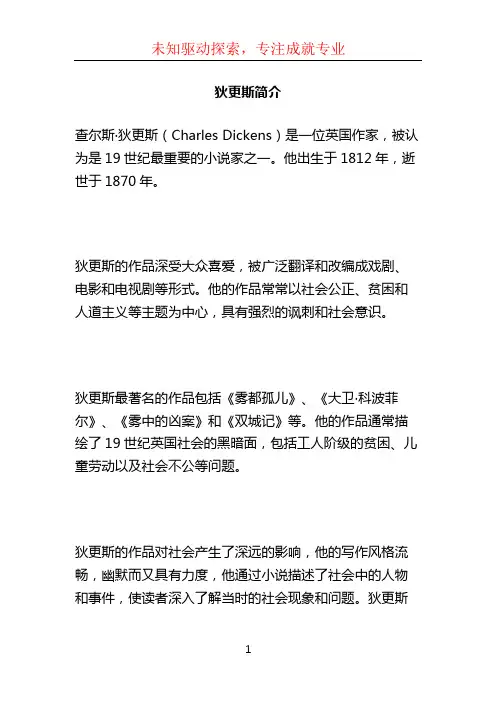
狄更斯简介
查尔斯·狄更斯(Charles Dickens)是一位英国作家,被认为是19世纪最重要的小说家之一。
他出生于1812年,逝世于1870年。
狄更斯的作品深受大众喜爱,被广泛翻译和改编成戏剧、电影和电视剧等形式。
他的作品常常以社会公正、贫困和人道主义等主题为中心,具有强烈的讽刺和社会意识。
狄更斯最著名的作品包括《雾都孤儿》、《大卫·科波菲尔》、《雾中的凶案》和《双城记》等。
他的作品通常描绘了19世纪英国社会的黑暗面,包括工人阶级的贫困、儿童劳动以及社会不公等问题。
狄更斯的作品对社会产生了深远的影响,他的写作风格流畅,幽默而又具有力度,他通过小说描述了社会中的人物和事件,使读者深入了解当时的社会现象和问题。
狄更斯
的作品也反映了他对社会不平等和不公正的关注,并提出了一些改革的思考。
狄更斯的作品不仅在当时获得了巨大的成功和影响力,而且至今仍然受到广大读者的喜爱。
他的作品被视为文学经典,他的创作风格和创新的故事情节继续深深地影响着后来的作家。
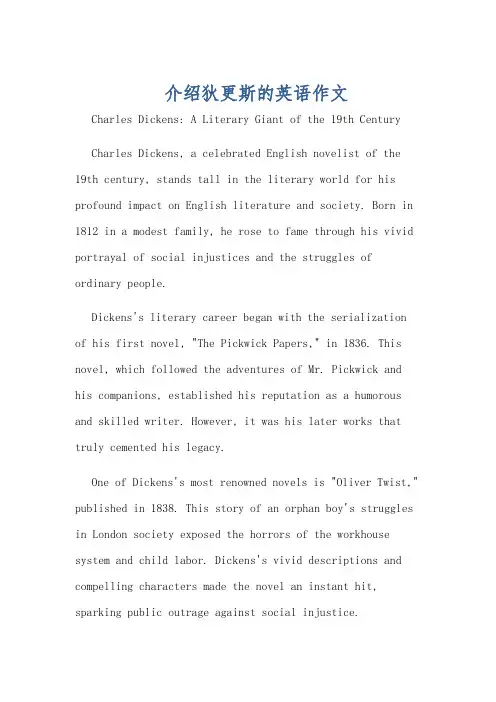
介绍狄更斯的英语作文Charles Dickens: A Literary Giant of the 19th Century Charles Dickens, a celebrated English novelist of the19th century, stands tall in the literary world for his profound impact on English literature and society. Born in 1812 in a modest family, he rose to fame through his vivid portrayal of social injustices and the struggles of ordinary people.Dickens's literary career began with the serialization of his first novel, "The Pickwick Papers," in 1836. This novel, which followed the adventures of Mr. Pickwick and his companions, established his reputation as a humorous and skilled writer. However, it was his later works that truly cemented his legacy.One of Dickens's most renowned novels is "Oliver Twist," published in 1838. This story of an orphan boy's struggles in London society exposed the horrors of the workhouse system and child labor. Dickens's vivid descriptions and compelling characters made the novel an instant hit, sparking public outrage against social injustice.Another masterpiece is "A Christmas Carol," first published in 1843. This heartwarming tale of redemption and generosity through the character of Ebenezer Scrooge has become a timeless Christmas classic, bringing joy and hope to readers during the holiday season.Dickens's works are known for their complex characters, intricate plots, and vivid descriptions of Victorian society. He was a master of serialization, releasing his novels in installments to keep readers engaged and anticipating the next chapter. His writing style was also groundbreaking, using colloquial language and dialect to give his characters authenticity and depth.Beyond literature, Dickens was also a social activist who campaigned for various reforms, including the abolition of slavery and the improvement of working conditions. His novels often served as powerful vehicles for social criticism, reflecting his passionate beliefs and commitments.In conclusion, Charles Dickens was a literary giant whose works continue to resonate with readers around the world. His portrayal of social injustices, compellingcharacters, and vivid descriptions have made him a timeless icon in the history of English literature.狄更斯:19世纪的文学巨匠查尔斯·狄更斯,这位19世纪著名的英国小说家,在文学界以他对英国文学和社会的深远影响而著称。
狄更斯文学巨匠狄更斯(Charles Dickens)是英国文学史上的一位巨匠,他的作品风靡世界,深深地影响着人们。
他以揭示社会不公、关注弱者命运、刻画丰富多样的人物形象而闻名于世。
本文将从他的生平、作品特点和对文学的影响三个方面,来介绍狄更斯这位文学巨匠。
一、生平狄更斯于1812 年2 月7 日出生在英国朴次茅斯。
他是家里八个孩子中的长子,从小就显露出写作的天赋。
他的父亲因为财政问题入狱,这使得狄更斯的童年充满了贫穷和不幸。
然而,这种艰难的经历反而给了他后来作品中丰富的想象力和对社会现实的敏感。
为了解救家庭,狄更斯在12 岁时开始工作,做过文书、小贩和律师助理等各种工作。
18 岁时,狄更斯投身于记者事业,并成为一名杂志编辑。
正是通过写作和采访,狄更斯慢慢积累了他后来作品中所需的故事和素材。
19 岁时,狄更斯迈入了文学创作的领域,他的第一部小说《皮克威克外传》开始连载。
小说很快获得了读者的关注和好评,狄更斯成为了当时最受欢迎的作家之一。
此后,他陆续发表了《雾都孤儿》、《艰难时世》、《双城记》等小说,进一步巩固了他的文学地位。
狄更斯在1870 年 6 月9 日去世,享年58岁。
他用自己的才华和努力成为了一位不朽的文学巨匠。
二、作品特点狄更斯的作品特点突出,不仅在文学世界中独树一帜,更展现了他独特的艺术风格和深刻的思想内涵。
首先,狄更斯擅长刻画形象。
他的小说中经常出现各种精彩且具有代表性的人物形象,每个人物都栩栩如生,根植于现实生活,令读者产生共鸣。
比如,《大卫·科波菲尔》中的大卫、《伟大的展望》中的莎拉都是人们所熟知的狄更斯式形象。
其次,狄更斯关注社会现实。
他的小说总是以社会为背景,通过对社会问题的揭示和人物经历的展示来反映现实。
他深刻关注贫苦人民的命运,批评社会不公,呼唤社会正义。
《雾都孤儿》中的孤儿奥利弗的命运,以及《双城记》中法国大革命的描写都展现了他对社会问题的关注。
第三,狄更斯的作品充满悬念与情感。
Introduction of Charles Dickens/狄更斯生平简介Charles DickensCharles Dickens was born on February 7, 1812, in Portsea, England. His parents were middle-class, but they suffered financially as a result of living beyond their means. When Dickens was twelve years old, his family’s dire straits forced him to quit school and work in a blacking factory, a place where shoe polish is made. Within weeks, his father was put in debtor’s prison, where Dickens’s mother and siblings eventually joined him. At this point, Dickens lived on his own and continued to work at the factory for several months. The horrific conditions in the factory haunted him for the rest of his life, as did the experience of temporary orphanhood. Apparently, Dickens never forgot the day when a more senior boy in the warehouse took it upon himself to instruct Dickens in how to do his work more efficiently. For Dickens, that instruction may have represented the first step toward his full integration into the misery and tedium of working-class life. The more senior boy’s name was Bob Fagin. Dickens’s residual resentment of him reached a fevered pitch in the characterization of the villain Fagin in Oliver Twist.After inheriting som e money, Dickens’s father got out of prison and Charles returned to school. As a young adult, he worked as a law clerk and later as a journalist. His experience as a journalist kept him in close contact with the darker social conditions of the Industrial Revolution, and he grew disillusioned with the attempts of lawmakers to alleviate those conditions. A collection of semi-fictional sketches entitled Sketches by Boz earned him recognition as a writer. Dickens became famous and began to make money from his writing when he published his first novel, The Pickwick Papers, which was serialized in 1836 and published in book form the following year.In 1837, the first installment of Oliver Twist appeared in the magazine Bentley’s Miscellany, which Dickens was then editing. It was accompanied by illustrations by George Cruikshank, which still accompany many editions of the novel today. Even at this early date, some critics accused Dickens of writing too quickly and too prolifically, since he was paid by the word for his serialized novels. Yet the passion behind Oliver Twist, animated in part by Dickens’s own childhood experiences and in part by his outrage at the living conditions of the poor that he had witnessed as a journalist, touched his contemporary readers. Greatly successful, the novel was a thinly veiled protest against the Poor Law of 1834, which dictated that all public charity must be channeled through workhouses.In 1836, Dickens married Catherine Hogarth, but after twenty years of marriage and ten children, he fell in love with Ellen Ternan, an actress many years his junior. Soon after, Dickens and his wife separated, ending a long series of marital difficulties. Dickens remained a prolific writer to the end of his life, and his novels—among them Great Expectations, A Tale of Two Cities, A Christmas Carol, David Copperfield, and Bleak House—continued to earn critical and popular acclaim. He died of a stroke in 1870, at the age of 58, leaving The Mystery of Edwin Drood unfinished.The Poor Laws: Oliver Twist’s Social CommentaryOliver Twist opens with a bitter invective directed at the nineteenth-century English Poor Laws. These laws were a distorted manifestation of the Victorian middle class’s emphasis on the virtues of hard work. England in the 1830s was rapidly undergoing a transformation from an agricultural, rural economy to an urban, industrial nation. The growing middle class had achieved an economic influence equal to, if not greater than, that of the British aristocracy.In the 1830s, the middle class clamored for a share of political power with the landed gentry, bringing about a restructuring of the voting system. Parliament passed the Reform Act, which granted the right to vote to previously disenfranchised middle-class citizens. The middle class was eager to gain social legitimacy. This desire gave rise to the Evangelical religious movement and inspired sweeping economic and political change.In the extremely stratified English class structure, the highest social class belonged to the “gentleman,” an aristocrat who did not have to work for his living. The middle class was stigmatized for having to work, and so, to alleviate the stigma attached to middle-class wealth, the middle class promoted work as a moral virtue. But the resulting moral value att ached to work, along with the middle class’s insecurity about its own social legitimacy, led English society to subject the poor to hatred and cruelty. Many members of the middle class were anxious to be differentiated from the lower classes, and one way to do so was to stigmatize the lower classes as lazy good-for-nothings. The middle class’s value system transformed earned wealth into a sign of moral virtue. Victorian society interpreted economic success as a sign that God favored the honest, moral virtue of the successful individual’s efforts, and, thus, interpreted the condition of poverty as a sign of the weakness of the poor individual. The sentiment behind the Poor Law of 1834 reflected these beliefs. The law allowed the poor to receive public assistance only if they lived and worked in established workhouses. Beggars risked imprisonment. Debtors were sent to prison, often with their entire families, which virtually ensured that they could not repay their debts. Workhouses were deliberately made to be as miserable as possible in order to deter the poor from relying on public assistance. The philosophy was that the miserable conditions would prevent able-bodied paupers from being lazy and idle bums.In the eyes of middle-class English society, those who could not support themselves were considered immoral and evil. Therefore, such individuals should enjoy no comforts or luxuries in their reliance on public assistance. In order to create the misery needed to deter immoral idleness, families were split apart upon entering the workhouse. Husbands were permitted no contact with their wives, lest they breed more paupers. Mothers were separated from children, lest they impart their immoral ways to their children. Brothers were separated from their sisters because the middle-class patrons of workhouses feared the lower class’s “natural” inclination toward incest. In short, the state undertook to become the surrogate parents of workhouse children, whether or not they were orphans. Meals served to workhouse residents were deliberately inadequate, so as to encourage the residents to find work and support themselves.Because of the great stigma attached to workhouse relief, many poor people chose to die in the streets rather than seek public aid. The workhouse was supposed to demonstrate the virtue of gainful employment to the poor. In order to receive public assistance, they had to pay in suffering and misery. Victorian values stressed the moral virtue of suffering and privation, and the workhouse residents were made to experience these virtues many times over.Rather than improving what the middle class saw as the questionable morals of the able-bodied poor, the Poor Laws punished the most defenseless and helpless members of the lower class. The old, the sick, and the very young suffered more than the able-bodied benefited from these laws. Dickens meant to demonstrate this incongruity through the figure of Oliver Twist, an orphan born and raised in a workhouse for the first ten years of his life. His story demonstrates the hypocrisy of the petty middle-class bureaucrats, who treat a small child cruelly while voicing their belief in the Christian virtue of giving charity to the less fortunate.Dickens was a lifelong champion of the poor. He himself suffered the harsh abuse visited upon the poor by the English legal system. In England in the 1830s, the poor truly had no voice, political or economic. In Oliver Twist, Dickens presents the everyday existence of the lowest members of English society. He goes far beyond the expe riences of the workhouse, extending his depiction of poverty to London’s squalid streets, dark alehouses, and thieves’ dens. He gives voice to those who had no voice, establishing a link between politics and literature with his social commentary.‹ Charles Dickens向上Motifs of Oliver Twist/雾都孤儿的中心思想›»添加新评论。
小说家狄更斯的简介查尔斯狄更斯是十九世纪英国最伟大的作家,作品揭露了社会的黑暗,赞扬了惩恶扬善的精神。
查尔斯狄更斯早年家境小康,曾经在私立学校接受过教育。
下面是店铺搜集整理的小说家狄更斯的简介,希望对你有帮助。
小说家狄更斯的简介查尔斯·狄更斯(Charles Dickens,1812--1870)是英国十九世纪伟大的批判现实主义作家,一生创作了大量作品,广泛描写了19世纪英国维多利亚时代的社会生活,揭露了资产阶级金钱世界的种种罪恶。
狄更斯(1812-----1870)英国现实主义作家,是继莎士比亚之后对实界文学产生巨大影响的小说家。
代表有《匹克威克外传》《双城记》《大卫·科波菲尔》等。
狄更斯所生活的年代,英国资本主义经济发展迅速。
经济繁荣的同时,现实的阶级矛盾也逐渐加深统治阶级疯狂追求利润,想发横财,工人们失业无家可归。
狄更斯从人道主义出发,呼吁统治者在追求个人利益的同时,不能剥夺劳动人民的权力,劝戒统治者要讲道德,有良知得人。
小说家狄更斯的生平1812年2月7日,狄更斯出生在英国南部朴次茅斯的波特西地区一个贫寒的小职员家庭里。
父亲是海军会计处的小职员,因无法清偿债务而被投进债务监狱。
这时刚满10岁的狄更斯不得不挑起全家生活重担,11岁时就被送到一家皮鞋油作坊去当童工。
为节省开支,母亲和弟妹都搬进监狱和父亲住在一起。
狄更斯在外做工,每逢星期日领到薪水就买些食物去监狱看望父母弟妹。
后来狄更斯的父亲继承了一位远亲的一笔遗产,还清债务后出狱。
狄更斯离开鞋油作坊进入一家小学读书,对学校里摧残儿童的野蛮教育十分反感。
狄更斯充满痛苦的童年生活,使他一生对穷人,特别是对贫苦儿童怀着深切同情,后来写了不少儿童题材的作品,如《大卫·科波菲尔》中就有他童年生活的影子。
由于家庭贫穷,狄更斯从16岁开始,先后做过律师的抄写员、事务所的信差、法院的速记员,这使他走遍伦敦的大街小巷,出入法院和监狱,接触到各种人物,了解到各种诉讼案件。
The Life and Works of Charles Dickens: ALiterary GeniusCharles Dickens, born on February 7, 1812, in Portsmouth, England, was a renowned novelist, journalist, and social critic. Considered one of the most influential writers of the Victorian era, Dickens's works not only entertained but also provided a critical commentary on the social and moral issues of his time. His unique blend of humor, pathos, and social commentary made him a household name throughout the United Kingdom and beyond.Dickens's early life was not without struggle. His father, a Navy clerk, died when he was only five years old, leaving his family in financial hardship. After a brief period of formal education, Dickens was forced to work in a factory and then as a reporter for a newspaper, experiences that deeply influenced his writing.In 1833, Dickens began his literary career with the publication of "Sketches by Boz," a collection of humorous essays and sketches based on his observations of London life. This was followed by the serialization of his first novel, "The Pickwick Papers," in 1836. The immensepopularity of this work established Dickens as a leading figure in the literary world.One of Dickens's most famous works is "Oliver Twist," published in 1838. This novel, set in London's underworld of poverty and crime, tells the story of an orphan boy's struggle for survival and his eventual triumph over adversity. Through Oliver's journey, Dickens exposed the cruelty and exploitation suffered by the poor and the need for social reform."A Christmas Carol," first published in 1843, is Dickens's most famous and beloved holiday tale. This heartwarming story of redemption and goodwill towards men has become a timeless classic, enjoyed by generations around the world.Other notable works by Dickens include "David Copperfield" (1850), an autobiographical novel about a young man's struggle to find his identity and purpose in life; "Bleak House" (1853), a complex legal thriller that critiques the flaws of the English legal system; and"Little Dorrit" (1857), a poignant tale of imprisonment and its impact on families.Dickens's writing style was unique and immediately recognizable. He had a remarkable ability to create vivid and believable characters, bringing them to life through meticulous descriptions of their appearance, mannerisms, and dialogue. His narratives were often serialized in periodicals, which kept his readers eagerly anticipating the next installment.Dickens's social commentary was as sharp as his humor. Through his novels, he exposed the injustices and hypocrisies of Victorian society, particularly the plight of the poor and the oppressed. His works were not just entertainment, but also calls for social reform and a more just and compassionate society.In addition to his writing, Dickens was also an active philanthropist and campaigner for social causes. He was deeply involved in various charitable organizations and used his fame and popularity to raise awareness and funds for those in need.Charles Dickens died on June 9, 1870, at the age of 58. However, his legacy lives on through his timeless works, which continue to captivate readers and inspire socialchange. His unique blend of humor, pathos, and social commentary has made him a lasting figure in the history of literature.**狄更斯:文学巨匠的生平与作品**查尔斯·狄更斯,1812年2月7日出生于英格兰的朴茨茅斯,是一位著名的小说家、记者和社会评论家。
Charles DickensCharles Dickens (7 February 1812 – 9 June 1870) was a famous English critical realism novelist in the 19th century. “He created some of the world's most memorable fictional characters and is generally regarded as the greatest novelist of the Victorian period. During his life, his works enjoyed unprecedented fame, and by the twentieth century his literary genius was broadly acknowledged by critics and scholars.” With time going by, his novels and short stories continue to be widely popular. In his works, he paid special attention to the life of "little guy" at the bottom of society in the UK, which deeply reflected the complex social reality at that time.LIFE AND CAREERCharles Dickens was born in Portsmouth on 7 February 1812, the second son of John and Elizabeth Dickens. He had a well-off family in his early years and was once educated in a private school for a period of time, but his parents often banqueted guests and used money without restraint. As a result, his father, inspiration for the character of Mr. Micawber in David Copperfield, was imprisoned for bad debt when Charles Dickens was 10 years old. “The entire family, apart from Charles, was sent to Marshalsea along with their patriarch. Charles was sent to work in Warren's blacking factory and endured appalling conditions as well as loneliness and despair.” He worked over 10 hours every day. After three years, luckily, his father inherited a legacy of the family, so their economic conditions were improved. He was returned to school, but the experience was never forgotten and became fictionalized in two of his better-known novels David Copperfield and Great Expectations.At the age of 15, he graduated from Wellington College, and then worked into a lawyer line. Later he turned to newspaper, becoming a reporter at the age of 20.“Like many others, he began his literary career as a journalist. His own father became a reporter and Charles began with the journals The Mirror of Parliament and The True Sun. Then in 1833 he became parliamentary journalist for The Morning Chronicle. With new contacts in the press he was able to publish a series of sketches under the pseudonym 'Boz'. In April 1836, he married Catherine Hogarth, daughter of George Hogarth who edited Sketches by Boz. Within the same month, came the publication of the highly successful Pickwick Papers, and from that point on there was no looking back for Dickens.”Besides a huge list of novels, “he published autobiography, edited weekly periodicals including Household Words and All Year Round, wrote travel books and administered charitable organizations. He was also a theatre enthusiast, wrote plays and performed before Queen Victoria in 1851. His energy was inexhaustible and he spent much time abroad - for example lecturing against slavery in the United States and touring Italy with companions Augustus Egg and Wilkie Collins, a contemporary writer who inspired Dickens' final unfinished novel The Mystery of Edwin Drood.He was estranged from his wife in 1858 after the birth of their ten children, but maintained relations with his mistress, the actress Ellen Ternan.” However, too much hard work and disappointment at reform seriously impaired his health. He died of astroke in 1870 and buried at Westminster Abbey. His tombstone wrote:“He was a sympathiser to the poor, the suffering, and the oppressed; and by his death, one of England's greatest writers is lost to the world.”MAJOR WORKSDickens wrote many works in his life, and the followings are some of his most important novels. They can be divided into different periods.From 1836 to 1841, it was the first period of youthful optimism. The major works are Sketches by Boz, The Pickwick Papers, Oliver Twist,Nichols Nickleby, The Old Curiosity Shop and so on. “Pickwick Papers(1836-37) was Dickens’ first big popular success, written when he was only twenty-four years old. It was issued in twenty monthly parts and is not so much a novel as a series of loosely linked sketches and changing characters featured in reports to the Pickwick Club. These episodes narrate comic excursions to Rochester, Dingley Dell, and Bath; duels and elopements; Christmas festivities; Mr Pickwick inadvertently entering the bedroom of a middle-aged lady at night; and in the end a happy marriage. Much light-hearted fun and a host of memorable characters are filled in this work. Oliver Twist(1837-38) expresses Dickens’ sense of the vulnerability of children. Oliver is a foundling, raised in a workhouse, who escapes suffering by running off to London. There he falls into the hands of a gang of thieves controlled by the infamous Fagin. He is pursued by the sinister figure of Monks who has secret information about him. The plot centres on the twin issues of personal identity and a secret inheritance (which surface again in Great Expectations). Emigration, prison, and violent death punctuate a cascade of dramatic events. This is the early Victorian novel in fine melodramatic form. It is recommended for beginners to Dickens.”The second period of excitement and irritation expose the corrupting influence of wealth and power, optimism turned into dissatisfaction and irritation.David Copperfield (1849-50) is a thinly veiled autobiography, of which Dickens said ‘Of all my books, I like this the best’. As a child David suffers the loss of both his father and mother. He endures bullying at school and a life of poverty when he goes to work. he soon runs away to his Aunt Betsey Trotwood in Dover. Aunt Betsey adopts him and sends him to Dr. Strong's private school in Canterbury, where David meets his best friend Agnes Wickfield, as well as the slimy Uriah Heep.David grew up and became a lawyer, he fall in love with beautiful but childish Dora Spenlow. He marries Dora, despite her uselessness in household chores. However, Dora Spenlow soon falls ill and dies, leaving David single and heartbroken. David is very sad, and left his country. He travels throughout Europe, during which time he publishes his first novel with the help of old school-friend Thomas Traddles, and during this odyssey realizes he loves Agnes Wickfield. Upon his return he proposes to her, and the two quickly marry. They later move into a house in London along with their young children. The book is packed with memorable characters such as Mr. Micawber, the fawning Uriah Heep, and the earth-mother figure Clara Peggotty. The plot involves Dickens’ recurrent topics of thwarted romance, financial insecurity and misdoings, and the terrible force of the legal system which haunted him all his life.The third period of intensifying (increasing) pessimism, showed underlying tone of bitterness, loss of hope for English bourgeois society. “A Tale of Two Cities (1859) was Dickens’ account of the French Revolution – with the story switching between London and Paris. It views the causes and effects of the Revolution from an essentially private point of view, showing how personal experience relates to public history. The characters are fictional, and their political activity is minimal, yet all are drawn towards the Paris of the Terror, and all become caught up in its web of suffering and human sacrifice. The novel features the famous scene in which wastrel barrister Sydney Carton redeems himself by smuggling the hero out of prison and taking his place on the scaffold.” The novel ends with the memorable lines: "It is a far, far better thing that I do, than I have ever done; it is a far, far better rest that I go to, than I have ever known." Great Expectations(1860-61) traces the adventures and moral development of the young hero Pip as he rises from humble beginnings in a village blacksmith’s. Eventually, via good connections and a secret benefactor, he becomes a gentleman in fashionable London – but loses his way morally in the process and disowns his family. Fortunately he is surrounded by good and loyal friends who help him to redeem himself. Plenty of drama is provided by a spectacular fire, a strange quasi-sexual attack, and the chase of an escaped convict on the river Thames. There are a number of strange psycho-sexual features to the characters and events, and the novel has two subtly different endings – both adding ambiguity to the love interest between Pip and the beautiful Stella. There are other famous works in this period, such as Bleak House(1852-1853), Hard Times(1854) and so on. STYLESHe has different writing styles in different periods. In his early period, the works are of gentle social criticism, Fantastic optimism, La novela picaresca and Exaggeration. In his middle period, the works are of vigorously criticizing on bourgeois and his morality, gentle moralism, humor and satire. At the same time, The plot and structure are more complete and unified. In his later period, the works are of social criticism, gentle reformism and strong humanitarian, exploration of man’s inner conflicts and symbolismHis literary style is also a mixture of fantasy and realism. “Dickens was once a newspaper reporter so his descriptions show a wonderful eye for detail. Dickens loved words, and liked to produce a 'pretty piece of writing' in different styles. He included lots of powerful adjectives, and is famous for his use of metaphors and similes. His descriptions often present people, their surroundings, and even the weather, in ways which reinforce each other, so that certain 'feel' is built up through the passage. From the early 1850s, Dickens gave public readings of his novels. His writing is rhythmic and designed to be read out loud. He loved to make young women in his audience laugh or weep, so many of his characters are either hilariously comic or heart-broken sentimental. In addition, Dickens was also a master of dialect and used what is called 'substandard' speech to add to the picture of a character he was building up.”References1.《插图本英国文学史》2. /wiki/Charles_Dickens3/history/historic_figures/dickens_charles.shtml4/5-most-popular-Charles-Dicken-books/articleshow/11805466.cms5/schools/gcsebitesize/english_literature/prosegreatexpect/0prose_greatex pect_contrev3.shtml。